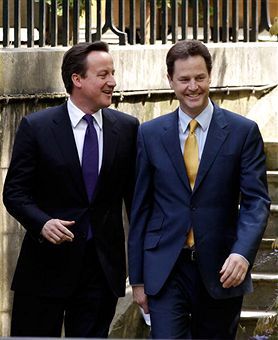 An ingenious man, John Hirst. First he achieved the considerable feat of committing
manslaughter with an axe; and he has since proceeded to cause governments no end of trouble. The prisoner voting saga is nearing its end and a fug of ignominy is descending on the government.
An ingenious man, John Hirst. First he achieved the considerable feat of committing
manslaughter with an axe; and he has since proceeded to cause governments no end of trouble. The prisoner voting saga is nearing its end and a fug of ignominy is descending on the government.
The BBC reports that the coalition is to dilute its policy of enfranchising prisoners serving less than four years. Now ministers will be seeking to enfranchise only those serving a year or less. This u-turn is the result of the alliance between Jack Straw and David Davis and the slew of assorted backbench dissent. Tim Montgomerie argues that this is yet another example of Downing Street’s inability to communicate with the parliamentary Tory party. That is so, but the government has been placed in an invidious position by the ECHR. Virtually no one in Britain wants to enfranchise prisoners with the exception of politicised lags, a smattering of Liberal Democrats and the swelling phalanx of human rights lawyers. In such a context, the government would do well to escape with a modicum of dignity, and a free vote on the diluted proposals is said to be Downing Street’s favoured option.
However, the diverse legal and political issues will be debated hereafter. Human rights are being redefined by judges and politicians; from where or whom do they issue? There are constitutional dilemmas also. Many politicians and lawyers do not see the ECHR’s judgement as a sovereignty issue; Ken Clarke added his voice to their position yesterday when he argued that the exponential growth of judicial review was doing more to emasculate ministerial action than the ECHR. An impressive group is arraigned against them – epitomised by former Law Lord, Lord Hoffman, who asserts (£) that supra-national courts should not ‘intervene in matters on which Member States of the Council of Europe have not surrendered their sovereign powers’. The need to reform the ECHR’s cumbersome practices and unaccountability and the tendency to lump the ECHR (which is a judicial check on executive power) with the European Union (which isn’t) blurs the delineated lines of debate, complicating the government’s already intricate battles with eurosceptics, libertarians and jurists. Verily, Hirst personifies the law of unintended consequences.






Comments